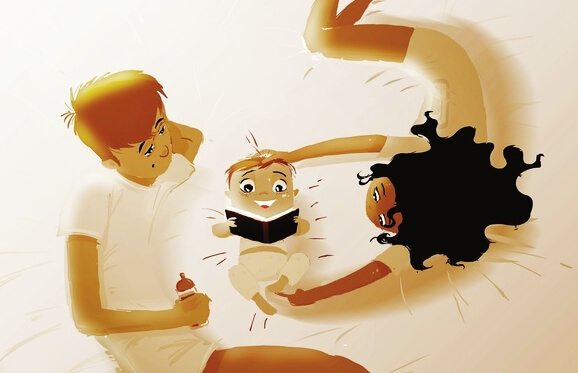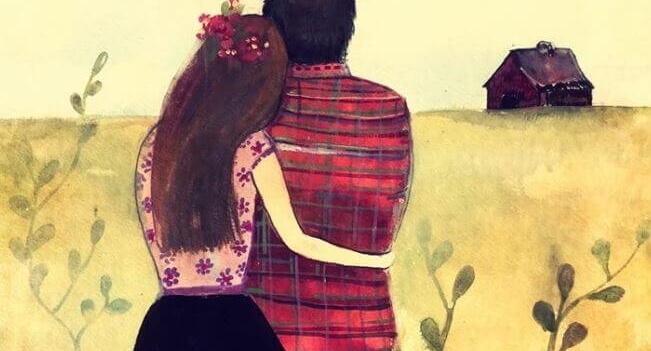You and I Are Parents, But We're Also Partners


Written and verified by the psychologist Valeria Sabater
You and I now have the best gift in the world: our baby. However, in addition to being parents, we’re also partners. We are two in one, two who continue to share looks and to draw partnership from caresses, being fully aware that we have entered a new era, something bigger, intense, different…
When talking about a couple’s relationship in terms of their children, it is very common to find books and articles that explain how, on the one hand, we must agree on the child’s education, or how on the other hand we must face the empty nest stage together once our children are ready to leave home.
But now… what about the couples themselves? What happens in that intimate and private sphere when the baby is first born, and in some way we are not the same as before?
Whether we want to or not, both the father and the mother undergo a small internal revolution where new roles appear, new responsibilities that somehow affect the relationship itself.
Today on You Are Mom, we want to address this.

Now We Are Three: When the Partnership Grows in All Senses
There are those who talk about a small crisis, new roles and even contradictory feelings. Until recently, it was often said that it’s common for the father to feel “displaced,” that the intimate dependence of the baby on the mother left the father figure pushed to one side.
However, today parenting is more active and more present, which invites us to focus on the private atmosphere of the couple in relation to their child in a way that is more nurturing, rich and positive for everyone.
We Are Tired, But Our Partnership, Magic and Affection Accompany Us
Those last-minute plans are over, when we do not cook and go out, leave for the weekend, just the two of us… Everything changes, we know, but the arrival of a child is a big change, and in a positive way.
Therefore, it is common for the most complex moments to be those in which you come home from the hospital, sharing responsibilities, tending to cries, changing diapers, adjusting work schedules and looking at our faces only to laugh at our dark circles and faces of exhaustion…
Everything is new and everything is intense. And couples’ new experiences are always lived with intensity. They are challenges that, in turn, allow us to know each other much better. These are times in which we come to love one another even more.
Mom and Dad Thank You for Leaving Them Alone. They Are Nesting!

After the birth of a baby, new parents will certainly appreciate a small interval of time spent in privacy and solitude. This time will be for the family to get used to the new member. There will be another time for friends to get to know the little treasure, and there will be time when we can fill the house with movement, laughter and good company.
But now, all the parents want to do is to nest, and that period of time generally lasts for as long as the father’s work leave – usually shorter than the mother’s – allows. It will help the parents to not only get to know the baby, but to also have him near and give him plenty of kisses, caresses and attention.
This will also make the couple look into each other’s eyes to find themselves as parents and as a family, leaving behind the era when it was just the two of them.
You and I Are Still One, But We Are Also Two in This New Era
During this new stage, multiple challenges will arise, challenges and responsibilities in which we always have to keep our children’s best interests in mind. However, there is one aspect that we must never neglect: our relationship as partners, our bond, that magic that must keep growing through the looks and small details.
Sometimes, this routine is so demanding that raising a child causes us to neglect certain things and to make us forget to look each other in the eyes, to laugh for no reason and, above all, to share nice words and to value each other as we did before.

The baby needs everything, we know, but this is not at odds with having time for intimacy, a special day where we allow the family to help us have dinner alone, a short break to talk and reconnect.
Likewise, we cannot forget that this relationship is built on a day-to-day basis, and it’s in our home and in our daily life that the most significant love is nourished, where we look out for one another and feed ourselves with good moments, partnership, caresses, laughter and those looks that say everything without the need for words…
All cited sources were thoroughly reviewed by our team to ensure their quality, reliability, currency, and validity. The bibliography of this article was considered reliable and of academic or scientific accuracy.
- NELDOR. (2015). El matrimonio hace a las personas más felices. Portafolio.
- Val, A. I. del. (2004). El futuro de la familia: la familia. Iglesia Viva: Revista de Pensamiento Cristiano.
- Melendo, T., & Granados, T. M. (2003). Matrimonio y felicidad(Vol. 736). Palabra.
- Ceballos, G. C. (2006). CONFIDENCIAS DE CASADOS, FAMOSOS Y FELICES: Claves para crecer como matrimonio. Editorial AMAT.
- Castillo, G. (2005). La camisa del casado feliz: el secreto de los matrimonios que funcionan. Amat Editorial.
- Alarcón, R. (2017). Funcionamiento familiar y sus relaciones con la felicidad. Revista peruana de Psicología y trabajo social, 3(1), 61-74.
- Núñez, B. (2007). Los secretos para un feliz matrimonio. Género y sexualidad en la segunda mitad del siglo XIX. Estudios de historia moderna y contemporánea de México, (33), 5-32. http://www.scielo.org.mx/scielo.php?pid=S0185-26202007000100005&script=sci_abstract&tlng=en
- Moreno Martín, F. (1999). La violencia en la pareja. Revista Panamericana de Salud Pública. https://scielosp.org/scielo.php?script=sci_arttext&pid=S1020-49891999000400008&lng=es&nrm=iso&tlng=es
- Perles, F., San Martín, J., Canto, J., & Moreno, P. (2011). Inteligencia emocional, celos, tendencia al abuso y estrategias de resolución de conflicto en la pareja. Escritos de Psicología / Psychological Writings. http://www.escritosdepsicologia.es/descargas/revistas/vol4num1/vol4num1_5.pdf
- Morón Gaspar, R. (2006). Terapia integral de pareja. EduPsykhé. https://doi.org/10.1109/CVPR.2013.167
This text is provided for informational purposes only and does not replace consultation with a professional. If in doubt, consult your specialist.








